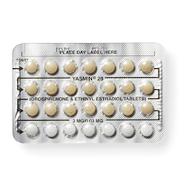Pill good news and bad news
Like any birth control method, the pill has its pros and its cons...

There was good news and not-so-good news for the pill this week. First, the good news: a new study confirms that women who have ever taken the pill—even for just a few years—have long-lasting protection from ovarian cancer. Previous research has shown that the pill also protects against uterine cancer and that, contrary to popular myth, using it is totally unrelated to breast cancer. Most of us don’t think of the pill as good medicine for long-term health, but in some ways it is!
And the not-so-good news: two new studies show that women using newer brands of the pill that contain certain types of progestin hormones (drospirenone, gestodene, desogestrel and cyproterone) and women using the patch are at a slightly higher risk of blood clots than women using older pills (most of which contain levonorgestrel). All the news coverage says the risk is double, which sounds scary—but “double” is still really small. To put it in context, the two new studies say about 6-10 per 10,000 women using newer pills or the patch will be affected in a year, but the risk of blood clots during pregnancy or soon after giving birth is at least three times that.
So what should you do if you’re using one of the higher risk pills or the patch? If you’re really concerned, you should talk to your doctor about other options, but if what you’re using has been working for you for a while without problems, you probably don’t need to worry since the risk of a blood clot is highest in the first few months of use. Remember, pregnancy is still riskier than any type of birth control, so if you’ve found a method you like, the best thing you can do is stick with it.
How do you feel about this article?

Heat up your weekends with our best sex tips and so much more.
